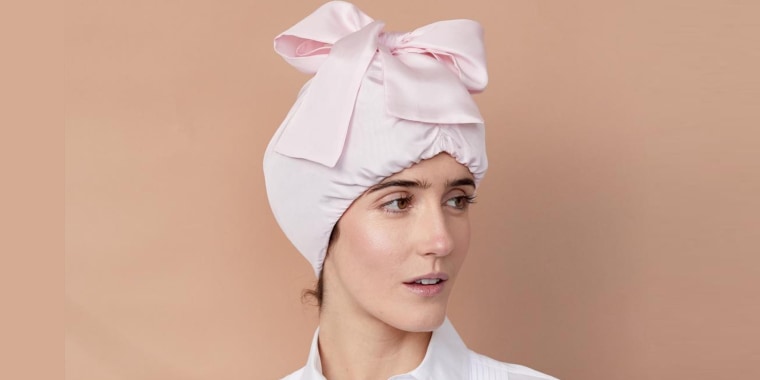After facing backlash for her collection of $75 silk hair bonnets, Sarah Marantz Lindenberg is speaking out.
The controversy started when the NiteCap designer shared the inspiration behind her brand in an interview with Fashion Magazine, saying that she realized a personal need for such a product while planning her wedding. Marantz Lindenberg had been experiencing breakouts on her face, neck and back, so she started to sleep with her hair pulled back, per a dermatologist's suggestion.
Silk scarves certainly helped, but Marantz Lindenberg wanted something that would stay put while she slept. And so, she said, the idea for NiteCap was born.
Since the interview was published last week, consumers quickly took to social media to voice their concerns, pointing out that NiteCap was hardly the first product of its kind.
In the interview, Marantz Lindenberg acknowledged that there are other products on the market and mentioned the age-old practice of hair wrapping, but failed to acknowledge the historical context. Social media users pointed out the product's origins as a staple for black women, calling NiteCap an example of adopting another culture for personal or professional gain (i.e. cultural appropriation). An editor's note has been added to the original article, saying, "Though not strictly used just for sleeping, the item has a long history in black hair culture."
Commenters also scoffed at the excessive price tag since similar versions are available for a fraction of the price. Marantz Lindenberg argues that the materials used and sustainable practices account for the high price point, but some Twitter users pointed out that people like Grace Eleyae, a black woman who co-founded Slap (Satin-Lined Cap), have alternatives for less than $50.
Howard University communications and culture professor Tia Tyree told NBC News that the African American community has touted the benefits of hair wraps for quite some time.
"In understanding or hearing her story, it’s amazing to me that her product was precipitated on an invention that came from a once-in-a-lifetime problem," Tyree said. "The benefits of hair wraps have been known for generations, so for anyone to market their product in a way that appeals to individuals as if this is a new idea is simply unacceptable because it negates the fact that African American women have had and used this product for decades."
The designer soon took to Instagram to address concerns.
In a statement to TODAY Style, Marantz Lindenberg said the following: "Hair wrapping and sleep bonnets have been used for centuries and I have never once claimed to have invented or come up with the concept, despite many stories and posts misquoting me. I introduced my version because I was unable to find a product on the market that worked for me — made locally and sustainably and from natural materials."
She also addressed concerns over the price: "The actual price of a NiteCap is $75 USD (the website is listed in Canadian dollars). The price point is such because it is made from 2 yards of 100% natural silk and creates minimal waste through a sustainable production process locally in Canada. We are also committed to supporting fair pay, worker safety and employ a female-owned and operated manufacturing facility."
Marantz Lindenberg also said she takes consumers' concerns seriously: "I’ve heard the voices and concerns over the last few days. Moving forward, I aim to take some time to determine how best to honor this tradition."
